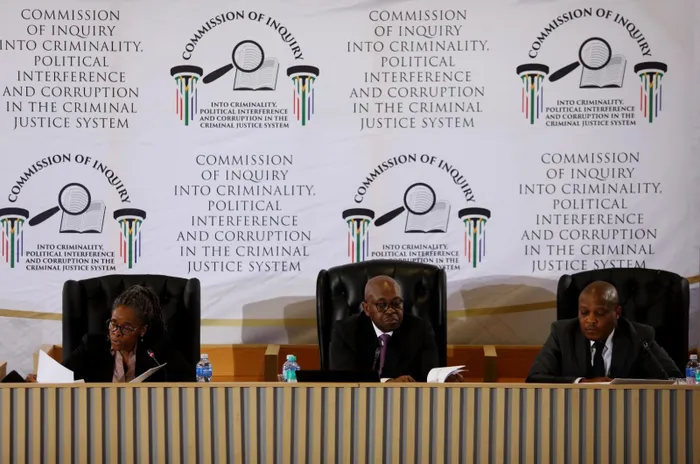
Professor Sipho Seepe, a political analyst and higher education consultant, expresses concerns about the effectiveness of commissions of inquiry in South Africa.
Image: Oupa Mokoena / Independent Newspapers
The commissions of inquiry normally have a role to play in a society but in South Africa they have lost their meaning due to their lack of implementation of the recommendations.
This is according to political analyst Professor Sipho Seepe, who commented on the role of commissions in the country amid public scepticism on whether the ongoing Madlanga Judicial Commission of Inquiry, set up by President Cyril Ramaphosa, will achieve its intended purpose.
The Commission, which has been adjourned until October 13, is probing allegations of criminality, political interference and corruption within South Africa's criminal justice system.
Seepe explained that commissions of inquiry are fundamentally designed to investigate and understand the root causes of social crises.
“They are geared more towards understanding so that you can come up with recommendations to prevent certain things from happening. But, what has happened in South Africa is that the commissions have lost their original mandate. They are now seen as places of fault-finding against certain people,” he said.
Seepe thinks public frustration with commissions is justified, given their hefty price tags.
The Madlanga Commission, for instance, is expected to cost taxpayers at least R147.9 million over six months while the Zondo Commission cost nearly R1 billion over four years, making it one of the most expensive.
“They are used to almost replace proper criminal investigation. For instance, the matter of Senzo Mchunu should have been left to the police to deal with the issue of crime, as one aspect. At the same time the police should have been beefed up to investigate this infiltration,” Seepe said.
Mchunu has been accused by the KwaZulu Natal SAPS commissioner Lieutenant General Nhlanhla Mkhwanazi of having issued an instruction to disband the Political Killings Task Team, established in 2018 to deal with politically motivated killings to collapse the team’s investigation into drug cartels.
Seepe expressed concern that the Madlanga Commission is likely to be ineffective because its recommendations are non-binding.
He pointed out that the Commission's non-binding recommendations would give Ramaphosa discretion over which ones to implement and which to ignore.
“For instance, the Zondo Commission made findings against people like Gwede Mantashe and Zizi Kodwa but these guys were promoted into ministerial positions. That was the position that the ANC took and Ramaphosa could not do anything other than what the party dictates,” he said.
Seepe noted that former Chief Justice Raymond Zondo expressed frustration publicly about the lack of action taken on his commission's recommendations.
He added that commissions are not a substitute for proper law enforcement. Instead, they serve as a mechanism to uncover truths and provide recommendations.
“The police have a mandate to prevent, combat and investigate criminality. The problem now is that the commissions seem to have taken out that responsibility from the police,” he said
Asked if the Madlanga Commission is likely to be different from the previous commissions, he said: “If Ramaphosa, as the President, were to become implicated the whole exercise would become useless because by law it is up to the executive to take those recommendations and decide what to do with them. So, the Madlanga Commission may be good for us in terms of understanding the rot but it may not be useful in terms of resolving the rot.”
On the other hand, Lawson Naidoo, executive secretary of the Council for the Advancement of the South African Constitution (CASAC), views commissions of inquiry as a vital tool for the state.
“The commissions are a necessary tool in the armoury of the State to conduct fact-finding investigations on matters of national public importance and that they make recommendations to the President,” he said.
He clarified that the Madlanga Commission's mandate is specifically focused on investigating criminality, political interference, and corruption within the criminal justice system, rather than corruption in general.
He also noted that the Commission's findings and recommendations are advisory in nature, meaning they do not have binding authority.
“Their findings and recommendations are merely advisory – they cannot usurp the functions of democratically elected officials. It is up to political actors, the public and civil society to put pressure on the government to ensure that recommendations are indeed implemented,” he said.
Naidoo believes that the establishment of commissions like the Madlanga Commission does not necessarily imply that existing laws are insufficient to deal with corruption and criminality.
“Part of the Madlanga Commission’s terms of reference require it to make proposals on policy, legislative or institutional reforms so the question is premature. However, the recent report of the National Anti-Corruption Advisory Council has made recommendations regarding the institutional architecture to fight corruption, as well as for the strengthening of law enforcement agencies,” he said.
Naidoo acknowledged the work by the Special Investigating Unit in rooting out corruption, especially in the wake of this week’s report unveiling a theft of R2bn from Tembisa Hospital.
rapula.moatshe@inl.co.za